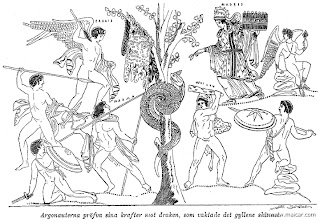After the debate of Ulysses and Ajax and the suicide of the latter in Book 13, Ovid moves to the story of Hecuba and Polymestor. But before he gets there, he runs quickly through a host of stories linked to Lemnos that have a lot to them in their own right. There's a curious thread running through them, having to do in part with women who kill husbands and kings -- they're certainly worth getting some familiarity with.
These include the story of Lemnos, King Thoas and Hypsipyle; the culmination of the misfortunes of Philoctetes; the curious story of Palamedes, the only man known to outwit Odysseus, and his father, Nauplius, who incites Clytemnestra and other kings' wives to be unfaithful to their husbands:
These include the story of Lemnos, King Thoas and Hypsipyle; the culmination of the misfortunes of Philoctetes; the curious story of Palamedes, the only man known to outwit Odysseus, and his father, Nauplius, who incites Clytemnestra and other kings' wives to be unfaithful to their husbands:
Nauplius swore revenge against King Agamemnon and the other Greek leaders. According to Apollodorus, when the Greeks were sailing home from Troy after the close of the war, Nauplius lit beacon fires along the perilous coastline of Euboea, and many ships were shipwrecked as a result. Before this point, he also convinced many of the lonely wives of the Greek commanders to be unfaithful to their husbands, and to conspire against them - including Clytemnestra, (Agamemnon's wife) who joined with Aigisthos, and Meda, (wife of Idomeneus) who was unfaithful with Leucos. Leucos killed Meda and her daughter Cleisithyra and drove out Idomeneus out when he had returned from Troy.
 |
| Drouais: Philoctetes in Lemnos |






